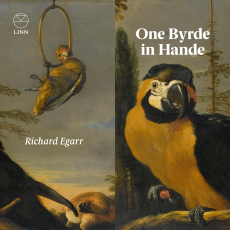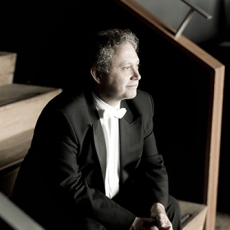Richard Egarr - One Byrde in Hande - Fanfare
While Bertrand Cuiller’s disc of Byrd’s keyboard music last year (Alpha 319; Fanfare 40:5) focused for the most part on the lighter dances, Richard Egarr’s new album of 16 pieces concentrates on more complex material, especially the fantasias, and grounds—of which The Bells is the best known, and for good reason. Given its focus, the album, entitled One Byrde in Hande, might just as well have been called Byrd’s Fancy, for his extraordinary invention takes center stage in most of these works.
It requires a first-rate technician, a scholar of style and musical analysis, and a showman capable of conveying the composer’s mercurially shifting expressive content. All this Egarr possesses in spades; and while the wild exuberance of Ut, re, mi, fa, sol, la, MB64 might call to his preference for the theatrical, he misses none of the delicacy and detail in the Lachrymae Pavan, MB54. He subsumes the span of Byrd’s lengthiest Fantasia, MB 62, with ease; while his performance of the Pavan and Gailiard, MB16, is noteworthy for its ability to convey a sense of spontaneity via phrasing, yet fully grounded (mea culpa) within the dance rhythms Byrd employed.
(As a side note, Egarr in his liner notes refers to MB16 being “unlikely of [Byrd’s] authorship” due to a lack of a reliable direct source. Yet surely a lack of a direct period source only means the authorship is not unquestioned, rather than unlikely? MB16 certainly sounds like Byrd, but whoever wrote it lived up his standards.)
My only concern is in the use of a single, unidentified instrument for the entire disc. Davitt Moroney, in his extensive undertaking to record all of Byrd’s keyboard music employed six different instruments. And while it could be said in defense of Egarr’s choice that there’s a great difference between listening to an hour’s worth of harpsichord music and listening to over eight hours, I think some of his selections might have benefited from a change of tonal character. MB16, for example, is performed by Moroney on a muselar virginal, to excellent effect.
That aside, I have no criticisms to offer. Egarr follows Byrd’s musical thought with both precision and passion. The engineering is a perfect match for his efforts, close but without instrumental noise. While Moroney’s set remains indispensable, for a single disc introduction of Byrd’s keyboard music this cannot be beat.

